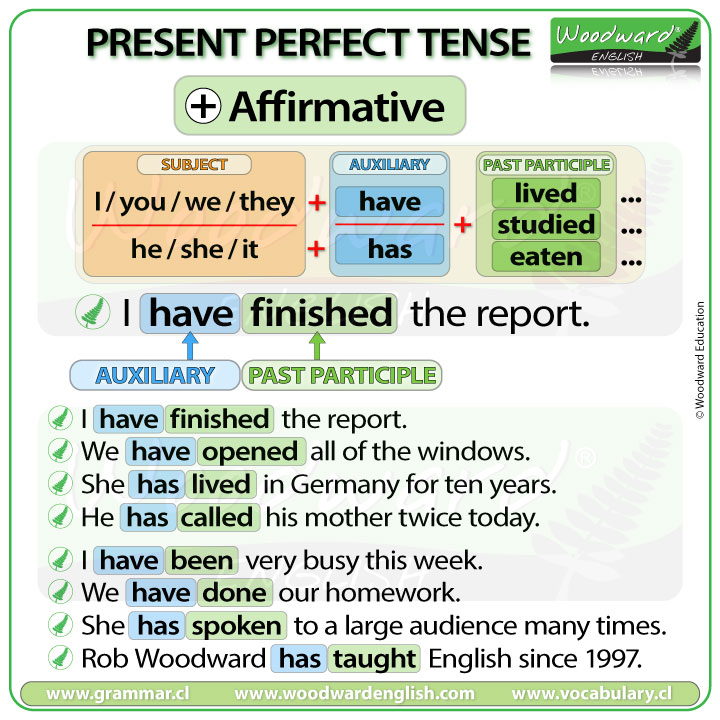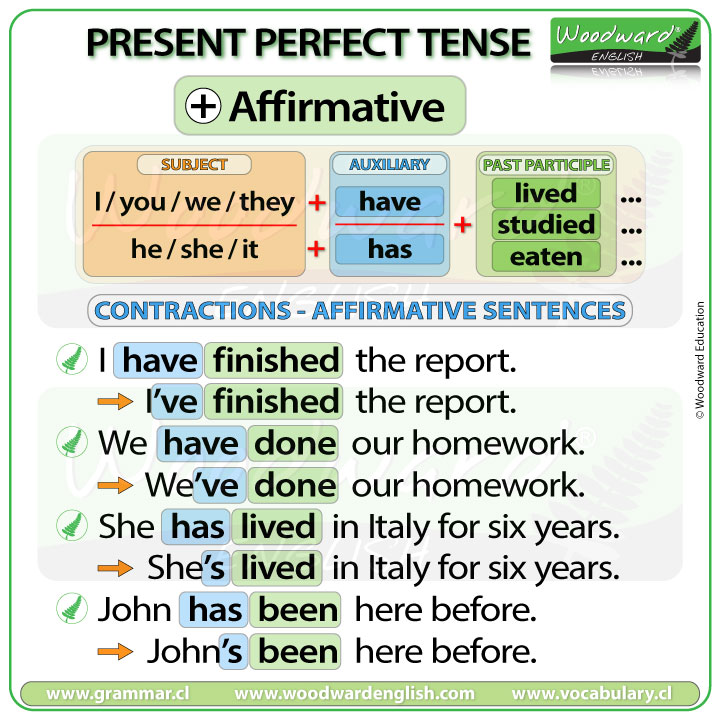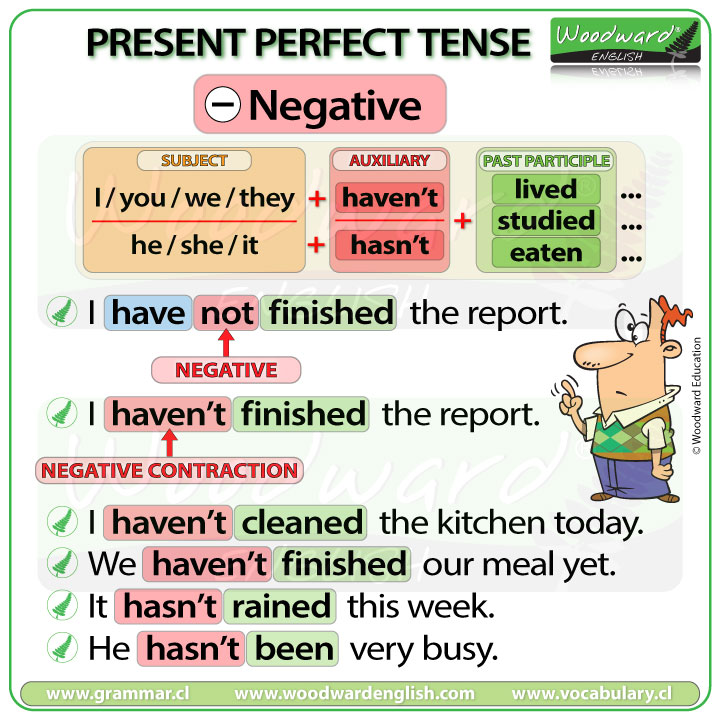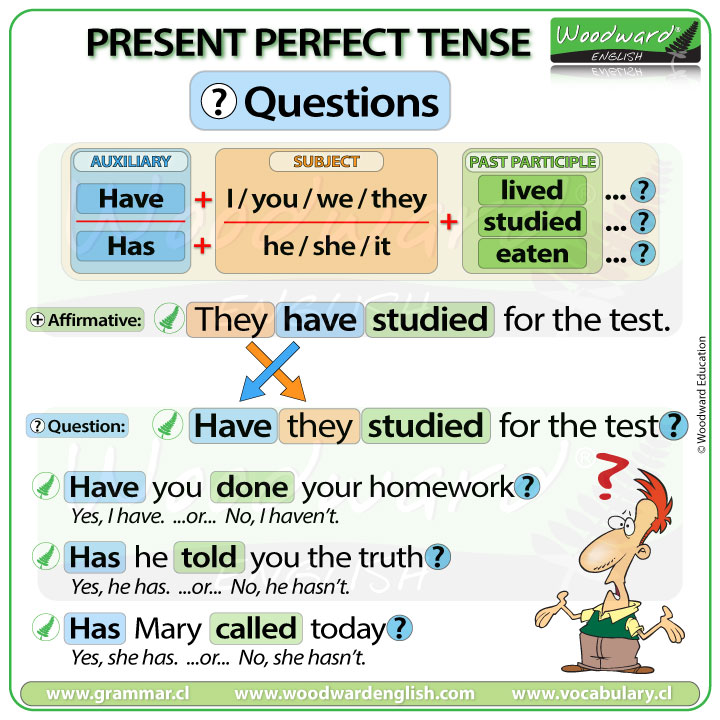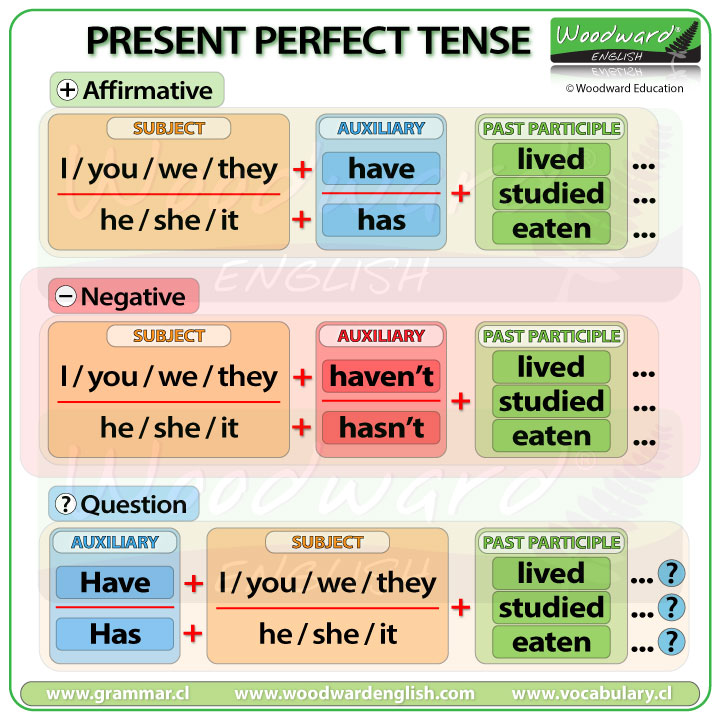Упражнения на пассивный залог во времени Present Perfect. Exercises with answers. Полезные разноплановые упражнения на страдательный залог помогут Вам разобраться в данной теме.
Упражнение 1. Read the texts and find the sentences with Present Perfect Active and Present Perfect Passive tense forms. Translate them into your language.
A)
Nina has lived in Sydney for two years. She has done a lot of things in Sydney. She has seen several plays, she has gone to the picture galleries and museums. She has visited the circus as well, and she has taken a tour to the Islands on Port Jackson. However, there are a lot of planned things she hasn’t done yet. She hasn’t gone to the Australian Reptile Park yet. Nina hasn’t been to some other parks yet.
B)
The boss is angry with his secretary today because important letters haven’t been typed yet. Tea has been given to him cold. Wrong telephone numbers have been written down. The mail hasn’t been sent in time. A lot of time has been spent over the telephone.
Упражнение 2. Change the sentences with Present Perfect Active into Present Perfect Passive.
Example:
I have already finished my work. My work …
— My work has already been finished.
- I have already taken the books back to the library. The books …
- She has just posted those letters. Those letters …
- The teacher has already checked my test. My test … —
- He has lost the key. The key …
- We have opened all the windows. All the windows … ‘
- I have bought bread on the way home. Bread …
- I have done this exercise. This exercise …
Упражнение 3. Imagine that your classroom and the school yard have been thoroughly cleaned. Say what has been done by whom.
Example The windows … (to wash)
— The windows have been washed by the girls.
- The desks … (to wash)
- The flowers … (to water)
- The floor … (to mop)
- The furniture … (to dust)
- The grass … (to cut)
- The trees … (to cut)
Упражнение 4. Answer the questions about your English lesson using Present Perfect Passive.
- Have you been asked to read a text?
- Has the text been translated?
- Have the new words been written down?
- Have the exercises been done by all the pupils?
- Has your friend been asked to recite something?
- Has large homework been given?
- Who has been given good (bad) marks?
- Have you been praised by the teacher?
Упражнение 5. Use Present Perfect Active or Passive of the verbs in brackets to complete the sentences.
- Peter … (to break) the window.
- The exercise … (to write) already.
- The text … (to translate) by Victor.
- The teacher just … (to explain) the new rule.
- We (to learn) the Passive Voice already.
- A new school … (to build) in this street.
Упражнение 6. Translate into English using Present Perfect Active or Passive.
- Я только что купил газету
- Телевизор только что выключили.
- Он уже ответил на вопрос
- Слова только что написали на доске
- Мы уже говорили об этом
- Все ответы уже даны.
- Об этом только что сказали по радио.
- Я уже смотрел этот фильм
- Мне ничего об этом не говорили
- Все предложения уже написаны.
Ответы:
Упражнение 1.
All the sentences in text A are in Present Perfect Active.
All the sentences in text B are in Present Perfect Passive.
Упражнение 2.
- The books have been already taken back to the library by me.
- Those letters have just been posted by her.
- My test has already been checked by the teacher.
- The key has been lost by him.
- All the windows have been opened by us.
- Bread has been bought by me on the way home.
- This exercise has been done by me.
Упражнение 3.
- The desks have been washed by the pupils.
- The flowers have been watered by Molly.
- The floor has been mopped by the cleaners.
- The furniture has been dusted by the boys.
- The grass has been cut by the caretaker.
- The trees have been cut by the workmen.
Упражнение 4. Your own answers.
Упражнение 5.
1 has broken, 2 has been already written, 3 has been translated, 4 has just explained, 5 have learnt, 6 has been built
Упражнение 6.
- I have just bought the newspaper.
- The TV-set has just been switched off.
- Не has already answered this question.
- The words have just been written on the blackboard.
- We’ve already spoken about it.
- All the answers have already been given.
- This has been just said over the radio.
- I’ve already watched this film.
- I haven’t been told anything about it.
- All the sentences have already been written.
Понравилось? Сохраните на будущее и поделитесь с друзьями!

Преобразуйте следуйщее предложения в Present Perfect Passive ( нижу предложений буду написаны как они буду начинаться)
1. I have alredy taken the book back to the library.
The books…
2. She has just posted those letters.
Those letters…
3.The techer has alredy a hecked any test.
My test…
4.He has lost they key.
The key…
5.We have apened all the windows.
All the windows…
6.I have bouht bread ante way home.
Bread…
7.I have done this exercise.
тут не помню
Светило науки — 3191 ответ — 59834 помощи
1.The books have already been taken back to the library
2.Those letters have just been posted
3.My test has already been checked by the teacher
4.The key has been losted by him
5.All the windows have been opened by us
6.Bread has been bought by me on my way home
7.This exercise has been done by me
Светило науки — 1087 ответов — 7859 раз оказано помощи
1. I have alredy taken the books back to the library.
The books have already been taken back to the library.
2. She has just posted those letters.
Those letters have just been posted.
3.The techer has alredy checked my test.
My test has already been checked.
4.He has lost the key.
The key has been lost.
5.We have opened all the windows.
All the windows have been opened.
6.I have bouht bread on the way home.
Bread has been bought on the way home.
7.I have done this exercise.
This exercise has been done.
Упражнения на пассивный залог во
времени Present Perfect.
Упражнение 1.
Read the texts and find the sentences with Present Perfect
Active and Present Perfect Passive tense forms. Translate them into your language.
A)
Nina has lived in Sydney for two years. She has done a lot of
things in Sydney. She has seen several plays, she has gone to the picture
galleries and museums. She has visited the circus as well, and she has taken a
tour to the Islands on Port Jackson. However, there are a lot of planned things
she hasn’t done yet. She hasn’t gone to the Australian Reptile Park yet. Nina
hasn’t been to some other parks yet.
B)
The boss is angry with his secretary today because important
letters haven’t been typed yet. Tea has been given to him cold. Wrong telephone
numbers have been written down. The mail hasn’t been sent in time. A lot of
time has been spent over the telephone.
Упражнение 2. Change the sentences with Present Perfect Active into Present
Perfect Passive.
Example: I have already
finished my work. My work … — My work has already been finished.
1.
I have already taken the books back to the library. The books …
2.
She has just posted those letters. Those letters …
3.
The teacher has already checked my test. My test …
4.
He has lost the key. The key …
5.
We have opened all the windows. All the windows …
6.
I have bought bread on the way home. Bread …
7.
I have done this exercise. This exercise …
Упражнение 3. Imagine that your classroom and the school yard have been
thoroughly cleaned. Say what has been done by whom.
Example The windows … (to wash) —
The windows have been washed by the girls.
1.
The desks … (to wash)
2.
The flowers … (to water)
3.
The floor … (to mop)
4.
The furniture … (to dust)
5.
The grass … (to cut)
6.
The trees … (to cut)
Упражнение 4. Answer the questions about your English lesson using
Present Perfect Passive.
1.
Have you been asked to read a text?
2.
Has the text been translated?
3.
Have the new words been written down?
4.
Have the exercises been done by all the pupils?
5.
Has your friend been asked to recite something?
6.
Has large homework been given?
7.
Who has been given good (bad) marks?
8.
Have you been praised by the teacher?
Упражнение 5. Use Present Perfect Active or Passive of the verbs in
brackets to complete the sentences.
1.
Peter … (to break) the window.
2.
The exercise … (to write) already.
3.
The text … (to translate) by Victor.
4.
The teacher just … (to explain) the new rule.
5.
We (to learn) the Passive Voice already.
6.
A new school … (to build) in this street.
Упражнение 6. Translate into English using
Present Perfect Active or Passive.
1. Я только что купил газету. 2. Телевизор только что выключили. 3.
Он уже ответил на вопрос. 4. Слова только что написали на доске. 5. Мы уже
говорили об этом. 6. Все ответы уже даны. 7. Об этом только что сказали
по радио. 8.Я уже смотрел этот фильм 9.Мне ничего об этом не говорили.
10.Все предложения уже написаны.
Ответы:
Упражнение 1. All the sentences in text A are in Present Perfect Active.
All the sentences in text B are in Present Perfect Passive.
Упражнение 2. The books have been already taken back to the library by me.
Those letters have just been posted by her. My test has already been checked by
the teacher. The key has been lost by him. All the windows have been opened by
us. Bread has been bought by me on the way home. This exercise has been done by
me.
Упражнение 3. The desks have been washed by the pupils. The flowers have
been watered by Molly. The floor has been mopped by the cleaners. The furniture
has been to dusted by the boys. The grass has been to cut by the caretaker. The
trees have been cut by the workmen.
Упражнение 4. Your own answers.
Упражнение 5. 1 has broken, 2 has been already written, 3 has been
translated, 4 has just explained, 5 have learnt, 6 has been built
Упражнение 6. I have just bought the newspaper. The TV-set has just been
switched off. Не has
already answered this question. The words have just been written on the
blackboard. We’ve already spoken about it. All the answers have already been
given. This has been just said over the radio. I’ve already watched this film.
I haven’t been told anything about it. All the sentences have already been
written.
Присоединяйтесь к Reverso, это удобно и бесплатно!
английский
арабский
немецкий
английский
испанский
французский
иврит
итальянский
японский
голландский
польский
португальский
румынский
русский
шведский
турецкий
украинский
китайский
Показать больше
(греческий, хинди, корейский, тайский…)
чешский
датский
греческий
фарси
хинди
венгерский
корейский
словацкий
тайский
Показать меньше
русский
Синонимы
арабский
немецкий
английский
испанский
французский
иврит
итальянский
японский
голландский
польский
португальский
румынский
русский
шведский
турецкий
украинский
китайский
Показать больше
чешский
датский
греческий
фарси
хинди
венгерский
корейский
словацкий
тайский
Показать меньше
На основании Вашего запроса эти примеры могут содержать грубую лексику.
На основании Вашего запроса эти примеры могут содержать разговорную лексику.
We opened all the windows and aired the room out for ten minutes.
We have not simply bored a window to Europe; we have opened all the gates of our hearts and souls to the West.
The first thing to do is leave open all the folders we want to be opened by Windows.
We opened the windows, but it was hotter outside than in the room; we placed ice round the bed-all to no purpose.
Мы отворили окна — но на дворе было жарче, чем в комнате; поставили льду около кровати — ничего не помогало.
Результатов: 338860. Точных совпадений: 1. Затраченное время: 153 мс
Documents
Корпоративные решения
Спряжение
Синонимы
Корректор
Справка и о нас
Индекс слова: 1-300, 301-600, 601-900
Индекс выражения: 1-400, 401-800, 801-1200
Индекс фразы: 1-400, 401-800, 801-1200
© 2013-2022 Reverso Technologies Inc. Все права защищены.
Упражнения на пассивный залог во времени Present Perfect.
Упражнение 1. Change the sentences with Present Perfect Active into Present Perfect Passive.
Example: I have already finished my work. My work … — My work has already been finished.
-
I have already taken the books back to the library. The books …
-
She has just posted those letters. Those letters …
-
The teacher has already checked my test. My test …
-
He has lost the key. The key …
-
We have opened all the windows. All the windows …
-
I have bought bread on the way home. Bread …
-
I have done this exercise. This exercise …
Упражнение 2. Imagine that your classroom and the school yard have been thoroughly cleaned. Say what has been done by whom.
Example The windows … (to wash) — The windows have been washed by the girls.
-
The desks … (to wash)
-
The flowers … (to water)
-
The floor … (to mop)
-
The furniture … (to dust)
-
The grass … (to cut)
-
The trees … (to cut)
Упражнение 3. Answer the questions about your English lesson using Present Perfect Passive.
-
Have you been asked to read a text?
-
Has the text been translated?
-
Have the new words been written down?
-
Have the exercises been done by all the pupils?
-
Has your friend been asked to recite something?
-
Has large homework been given?
-
Who has been given good (bad) marks?
-
Have you been praised by the teacher?
Упражнение 4. Use Present Perfect Active or Passive of the verbs in brackets to complete the sentences.
-
Peter … (to break) the window.
-
The exercise … (to write) already.
-
The text … (to translate) by Victor.
-
The teacher just … (to explain) the new rule.
-
We (to learn) the Passive Voice already.
-
A new school … (to build) in this street.
Упражнение 5. Translate into English using Present Perfect Active or Passive.
-
Я только что купил газету. 2. Телевизор только что выключили. 3. Он уже ответил на вопрос. 4. Слова только что написали на доске. 5. Мы уже говорили об этом. 6. Все ответы уже даны. 7. Об этом только что сказали по радио. 8.Я уже смотрел этот фильм 9.Мне ничего об этом не говорили. 10.Все предложения уже написаны.
Affirmative Sentences
- I have finished the report.
This is a sentence in the present perfect tense.
We know it is in the present perfect tense because it has the auxiliary verb HAVE (or HAS) followed by a PAST PARTICIPLE.
Look at the structure for affirmative sentences in the present perfect tense. The word order is:
subject + have / has + past participle
Past Participles
The past participle can be regular or irregular.
Let’s look at the present perfect tense with regular past participles.
Regular past participles end in ED.
Some example sentences:
- I have finished the report.
- We have opened all of the windows.
- She has lived in Germany for ten years.
- He has called his mother twice today.
Notice how the past participle of these regular verbs is the same as the past simple tense form.
But some past participles are IRREGULAR. For example:
- I have been very busy this week.
(Been is the past participle of TO BE) - We have done our homework.
(Done is the past participle of TO DO) - She has spoken to a large audience many times.
(Spoken is the past participle of TO SPEAK) - Rob Woodward has taught English since 1997.
(Taught is the past participle of TO TEACH)
Notice how the past participle of these irregular verbs is different from their past tense form.
I recommend our lesson about 101 Irregular Past Participles with example sentences in English.
Present Perfect Tense Contractions – Affirmative Sentences
In spoken English, we almost always use contractions with the present perfect tense. We contract the subject and the auxiliary have / has.
For example: I have
We contract the subject I with the auxiliary HAVE which becomes I’VE … and then you can add the past participle.
Here is the list of present perfect tense contractions:
- I have ➡️ I’ve
- You have ➡️ You’ve
- He has ➡️ He’s
- She has ➡️ She’s
- It has ➡️ It’s
- We have ➡️ We’ve
- They have ➡️ They’ve
Let’s look at some example sentences.
Can you change these present perfect sentences to contain a contraction?
- I have finished the report.
- We have done our homework.
- She has lived in Italy for six years.
- John has been here before.
Here are the answers:
- I have finished the report. ➡️ I’ve finished the report.
- We have done our homework. ➡️ We’ve done our homework.
- She has lived in Italy for six years. ➡️ She’s lived in Italy for six years.
- John has been here before. ➡️ John’s been here before.
Now, let’s look at how to make negative sentences in the present perfect tense.
Present Perfect Tense – Negative sentences
Look at this affirmative sentence:
- I have finished the report.
There is the auxiliary HAVE and the past participle FINISHED.
How can we make this negative?
To create a negative sentence in the present perfect tense, we just add NOT between the auxiliary HAVE or HAS and the past participle.
- I have finished the report. (This is an affirmative sentence)
- I have not finished the report. (This is a negative sentence)
However, it is much more common to use a contraction in negative sentences.
You will normally hear:
- I haven’t finished the report.
Look at this affirmative sentence:
- She has seen the movie.
How can we make this negative?
To create a negative sentence in the present perfect tense, we just add NOT between the auxiliary HAVE or HAS and the past participle.
- She has seen the movie. (This is an affirmative sentence)
- She has not seen the movie (This is a negative sentence)
However, it is much more common to use a contraction in negative sentences.
You will normally hear:
- She hasn’t seen the movie.
Let’s look at some more examples of negative sentences in the present perfect tense:
- I haven’t cleaned the kitchen today.
- We haven’t finished our meal yet.
- It hasn’t rained this week.
- He hasn’t seen the movie.
Here is the summary chart to make negatives sentences in the present perfect tense.
We have the subject + negative auxiliary (haven’t/hasn’t) + past participle
Present Perfect Tense – Questions
Look at this affirmative sentence:
- They have studied for the test.
It has the subject THEY, the auxiliary HAVE and the past participle STUDIED.
How can we change this into a question?
To make a question in the present perfect tense, we change the order of the subject with HAVE / HAS.
- They have studied for the test. … becomes …
- Have they studied for the test?
Look at this affirmative sentence:
- She has arrived early.
How can we make this a question? We change the order of the subject and the auxiliary. The question becomes…
- Has she arrived early?
Let’s look at some more examples of present perfect questions:
- Have you taken your medicine today?
- Have we finished for the day?
- Has the game started?
- Has she read the report? (Remember READ is the past participle of READ – yes, they have the same spelling but the pronunciation is different)
Present Perfect Tense – Short Answers
We can also give short answers to present perfect tense questions.
Look at these questions:
- Have you done your homework?
- Has he told the truth?
- Has Mary called today?
Obviously, you can reply with just YES or NO, but in reality, we almost always give a short answer.
Present perfect short answers use HAVE or HAVEN’T in them.
Let’s look at the first question:
- Have you done your homework?
Since this question is HAVE YOU…?
The short answers would be: Yes, I have. … or … No I haven’t.
- Have you done your homework? Yes, I have. … or … No, I haven’t.
What would the short answers be for the next two questions?
- Has he told the truth?
- Has Mary called today?
You could say:
- Has he told the truth? Yes, he has. … or … No, he hasn’t.
- Has Mary called today? Yes, she has. … or … No, she hasn’t.
Present Perfect Tense with Questions Words
We can also use question words (what, where, why, etc.) at the beginning of the question. For example:
- What have you done?
- Where has he gone?
- Why have they stopped?
- How has she felt today?
Present Perfect Tense Summary Chart
In the next lesson we are going to look at WHEN to use the present perfect tense in English.
I hope you found this lesson about the present perfect tense useful.
If you did, please let other people know about it.



